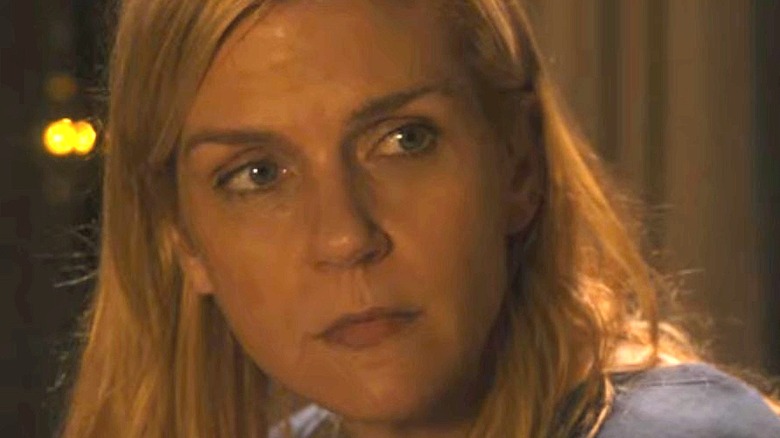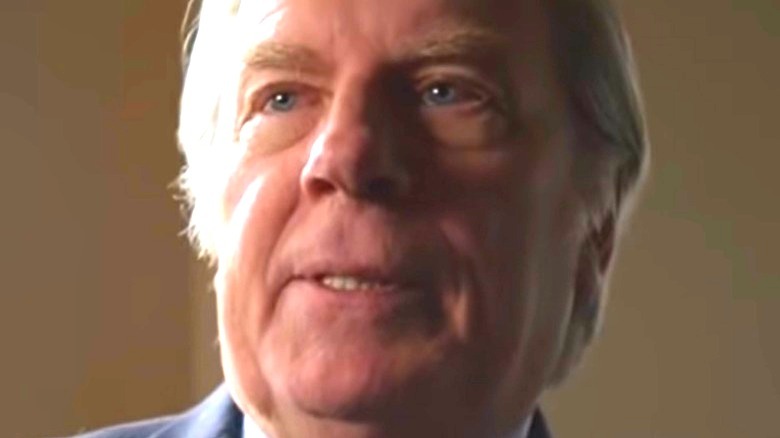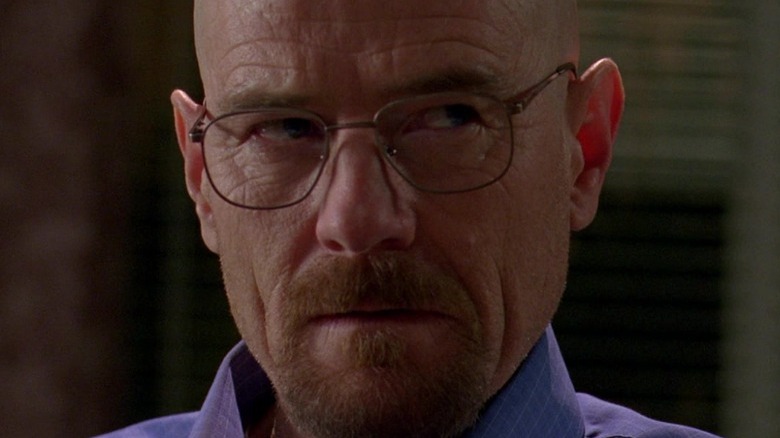The Real Reason Jimmy Asked The Time Machine Question In Better Call Saul's Finale
Warning: Spoilers for the series finale of "Better Call Saul" follow.
The series finale of "Better Call Saul" was appropriately titled "Saul Gone," and the meaning of the title can be understood as both the letting go of a façade and accepting a path to redemption. After six seasons (plus four previous seasons on "Breaking Bad") following Jimmy McGill/Saul Goodman/Gene Takavic (Bob Odenkirk), "Better Call Saul" decided to opt for a more realistic conclusion instead of flipping the script and allowing "Slippin' Jimmy" to remain in con artist mode to the end. For a prequel series that always took greater focus on its quieter, character study moments, it is also not surprising that the fireworks of the "Breaking Bad" finale from 2013 were not repeated.
A series finale will forever live on as a full stop, and "Saul Gone" had an alternate ending that was considered, and likely numerous brainstorming sessions in the writer's room in the lead-up to choosing its final act. In an interview with The Hollywood Reporter after the finale aired, series co-creator Peter Gould commented, "What is the right ending for this guy? What is the right moment to leave him? What is the right moment to leave Kim?" What unfolded in the episode answered all of these questions that had been building up since the premiere of Season 1 back in 2015.
The narrative of the series reached its final destination, but in true "Better Call Saul" fashion, the episode was also filled with symbolism, and the mention of a time machine provided the gateway to unlocking the meanings.
The theme of regret reoccurs throughout the episode
With the events of "Breaking Bad" in mind, as well as all of the character antics throughout "Better Call Saul," it is only natural that many of these morally ambiguous characters would contemplate the notion of regrets, as pointed out by Entertainment Weekly. For some characters, this theme manifested itself in subtle ways. Mike Ehrmantraut (Jonathan Banks), accepted his criminal impulses while never losing sight of the difference between right and wrong. This allowed Mike to look back on his decisions with regret while also coming to terms with his true nature.
The episode opens with an unseen flashback to the events of Season 5, Episode 8, "Bagman." Saul and Mike are in the desert trying to bring back the money to post Lalo Salamanca's (Tony Dalton) $7 million bail. The two stop by a watering hole in the desert to rest, and Saul asks Mike what date he'd like to travel back to if he had a time machine. Mike says he'd go back to December 8, 2001, which is presumably when his police officer son was murdered by his fellow cops, but changes his answer to a date in 1984, the day he took his first bribe and started becoming a dirty cop himself. The implication is that Mike would not accept the bribe and would therefore avoid a criminal life. When Mike turns the question back to Saul, he simply replies that he would go back in time to steal lucrative ideas from inventors to become rich.
Walter White and Chuck McGill are Jimmy's biggest regrets
In the next flashback, Walter White (Bryan Cranston) and Saul talk underneath Ed Galbraith's (Robert Forster) vacuum shop, amid events that took place in Season 5, Episode 7 of "Breaking Bad." After disguising the time travel question as quantum physics, Walter tells Saul to "just ask me if I have any regrets in my life." Walt cites his biggest regret as allowing old friends Elliot and Gretchen Schwartz to take his company Gray Matter technologies away from him. He wants to rewrite history since it was Walter's pride that caused him to leave the company, which further implies that he has yet to make peace with his actions, just like Saul at that time who aided Walter on his path of destruction.
The final flashback is between Jimmy and his older brother Chuck McGill (Michael McKean), which occurs early in the "Better Call Saul" timeline. In typical Jimmy and Chuck fashion, the two argue over Chuck's perception of Jimmy's work as an attorney being lesser than the perceived important work that Chuck undertakes in the same role. Jimmy notices that Chuck is reading a copy of H.G. Wells' "The Time Machine." This brings the flashbacks full circle and allows the viewer to interpret Jimmy's volatile and unresolved relationship with his brother as his biggest regret.
As the episode closes, we expect Jimmy to ask Kim the same question when she visits him in prison. But he doesn't. He would change nothing about their relationship.


